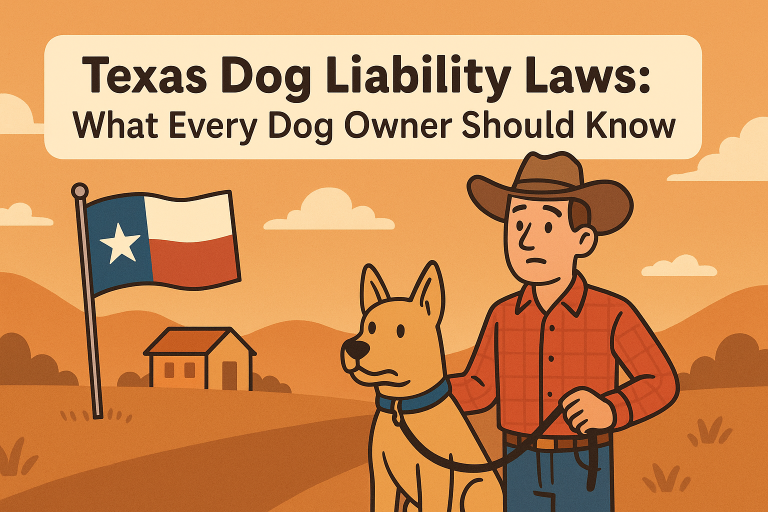Owning a dog in Texas comes with its fair share of responsibilities, especially when it comes to understanding liability in the event of a dog bite. Unlike some other states with strict liability laws, Texas follows what’s known as the “one-bite rule.” This law can be confusing for both dog owners and landlords, particularly for renters who need to prove they’re covered before signing a lease. Let’s break down what this means, how it applies to you, and when dog liability insurance may be needed.
What Is the “One-Bite Rule” in Texas?
Texas is one of several states that follows the “one-bite rule,” a legal standard that can impact how liability is determined in dog bite cases. In simple terms, a dog owner in Texas is generally not held strictly liable the first time their dog bites someone unless they knew or should have known the dog was dangerous.
That means if your dog has never shown aggression before and bites someone for the first time, you may not automatically be liable. However, if your dog has a history of biting, snapping, lunging, or being labeled “dangerous,” you could be held responsible for any future incidents. Once there’s documented knowledge of aggression, liability becomes much easier to prove in court.
This rule doesn’t mean you’re off the hook for a first-time bite, though. If you were negligent, like letting your dog roam off-leash in a public space, you could still face legal consequences.
How the Law Impacts Renters
For renters, the “one-bite rule” can be tricky. Many landlords in Texas require proof that tenants with dogs carry dog liability insurance, especially if the dog belongs to a breed known for aggression or if the property is part of a multi-unit complex. Even though Texas does not impose automatic liability, landlords do not want to risk being named in a lawsuit.
Renters may be asked to provide a Certificate of Insurance (COI) that clearly states the dog is covered under a liability policy. This helps reassure the property owner that if a dog bite or injury occurs on the premises, the tenant—not the landlord—will be financially responsible.
In short, even if Texas law gives some leeway for first-time bites, landlords often have stricter rules. Without proper coverage, you may be denied housing or face eviction if your dog causes harm.
Landlord Responsibilities and Concerns
Landlords in Texas are typically not liable for dog bites that occur on their property unless they knew the dog was dangerous and failed to act. That said, many still choose to protect themselves by requiring tenants to maintain dog liability insurance or adding them as an “additional insured” on the policy.
Why? Because legal fees and medical bills from dog-related injuries can be steep. If a victim decides to sue both the dog owner and the landlord, being able to show proof of insurance goes a long way in protecting everyone involved.
Landlords may also include clauses in lease agreements that limit the types of dogs allowed on the property or require behavior training and proof of vaccinations. These extra steps are all part of managing risk under Texas’s unique liability laws.
When Dog Liability Insurance Is Needed in Texas
While dog liability insurance isn’t required by Texas law, it is highly recommended—especially for renters. Here’s when you should seriously consider getting covered:
-
You rent your home: Many property managers and landlords in Texas now require renters with dogs to show proof of liability coverage. Without it, you may not be approved for housing.
-
You own a breed that’s commonly restricted: Even if your dog has never bitten anyone, certain breeds like pit bulls, Rottweilers, and German shepherds are often flagged as high-risk. Insurance provides added protection.
-
Your dog has shown past aggression: If your dog has snapped, bitten, or been reported to animal control, you could be held liable for future incidents. Insurance helps cover medical expenses, legal fees, and damage claims.
-
You want to protect your finances: Dog bites can lead to lawsuits, and even a single incident can cost thousands. Liability insurance can be an affordable way to avoid major out-of-pocket expenses.
Remember, not all renters or homeowners insurance policies automatically include coverage for dog-related incidents. You may need to add an endorsement or purchase a stand-alone policy to get the protection you need.
Final Thoughts: Stay Covered and Stay Smart
Texas dog bite laws can feel murky, but the best way to stay protected is by knowing the rules and having proper insurance in place. The “one-bite rule” offers some flexibility, but it’s not a free pass. Once your dog has shown any signs of aggression—or even if you own a breed that’s viewed as risky—it’s smart to be proactive.
Renters, in particular, should be prepared to show a COI when applying for housing. Landlords may have stricter standards than the state, and insurance can be the key to securing and keeping your rental.
If you own a dog in Texas, take a few minutes to review your current coverage. Having the right dog liability insurance in TX could be the difference between a manageable situation and a financial disaster.



